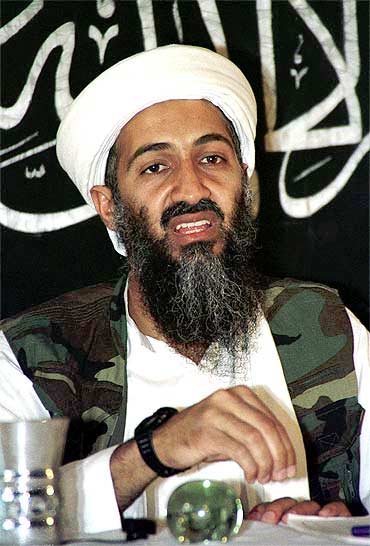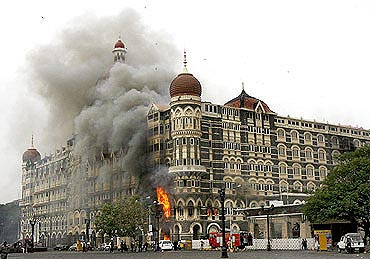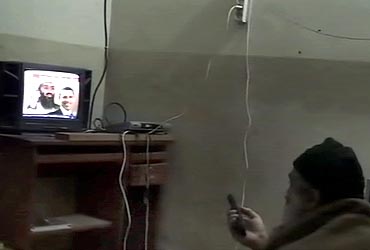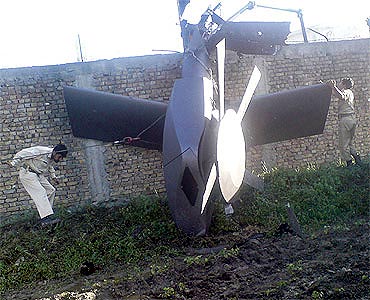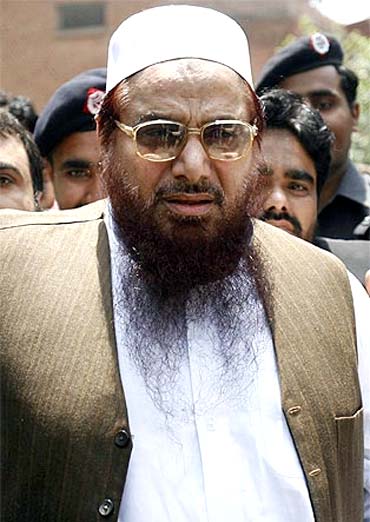 | « Back to article | Print this article |
Post-Osama, world not any safer: Ex-R&AW chief
Although the Al Qaeda has never been much of a concern for India, it's the Lashkar whose growth and reach is something to worry about. Rediff.com's Vicky Nanjappa speaks to C D Sahay, former boss of the Research and Analysis Wing (April 2003 to January 31) and Stephen Tankel, an expert on the LeT, for their take on the issue.
Can India undertake such an attack?
Sahay: Without being Indo-Pak specific, any professional security outfit should be able to carry out such tasks. One would, of course, need accurate and actionable intelligence on all aspects of the target, an operationally fit and trained team of commandos, state-of-the-art logistic support, real-time electronic monitoring to update intelligence and a totally secure communication link between the command centre and the operational team.
The list of course is not exhaustive. Great deal of careful planning and rehearsals under a near-identical scenario will facilitate a quick and surgical strike.
Click NEXT to read further...
Coverage: US hunts down Osama bin Laden
'Osama did not have a direct role in India-related terror'
Sahay: bin Laden and the Al Qaeda did not have a direct role in the execution of terrorist-related violence in India. Its affiliates and entities sponsored and promoted by the Inter-Services Intelligence, like the LeT, Jaish-e-Mohammed etc have been largely responsible for major acts of terrorism in India. The role of the Indian Mujahideen has also been significant. Therefore, the pattern and intensity of terrorist violence in India is unlikely to witness any significant change.
However, the intelligence and security apparatus would need to exercise extra vigilance to deal with any backlash in the wake of bin Laden's death. He is gone but the culture of violence, the philosophy of Islamic jihad, the network of global terrorism established over the years, would not disappear so easily. I do not think that the world is any safer today than it was a few days earlier.
However, bin Laden's extraction is a huge boost to the US-led war on terror and should cause some anxious moments, sleepless nights to the Pakistan security and intelligence machinery that continues to provide support and sanctuary to a large number of 'wanted' men, including all of India's most wanted.
'US right in not releasing Osama photos'
Sahay: Al Qaeda had not ended with Osama's killing. Over the past many years, he was not playing any direct role in guiding the Al Qaeda operations. Most of the regional and affiliated networks were operating under a decentralised system. This would continue with the regional units playing more assertive and independent roles. The succession issue in the Al Qaeda will hugely impact the future course of the movement. Indeed, in the short term perceptive, there will be revenge attacks particularly in Pakistan, parts of Afghanistan and against softer US targets worldwide.
Should the Osama photos have been released?
Sahay: This is not really an important issue. No one doubts the death of bin Laden and, despite some initial contradictions in the operational details, a fairly clear picture had emerged on the kind of operation carried out leading to his killing. The US has, perhaps, done the right thing by not releasing the photographs, which would have surely evoked anger among bin Laden's followers and supporters.
'It'll surprising to see India conduct a Abbottabad-style raid'
Sahay: It's strange that each time an event of this nature takes place, the strategic experts community and the media tend to go ballistic on Indo-Pak issues. There is need to de-link this debate from the US operations in Abbottabad. There is a qualitative difference between US-Pak and Indo-Pak relations. The situations are incomparable.
Our friends across the border may not like this but Pakistan has, over the years, reduced itself to a 'client state' role vis- -vis the US, surviving on its economic largess and doing its bidding. However, in a typically dubious Pakistani style and character, they continue to follow the policy of running with the hare and hunting with the hound as far as its role as the key US ally in the war on terror is concerned. And the manner in which the US deals with Pakistan's protests is amply visible in the continuing drone attacks after bin Laden's death despite Pakistan's warnings of serious consequences!
What we tend to forget is the fact that India has never followed the policy of deep penetration operations inside other countries to eliminate terrorists. India has not done so, despite a decade of terrorist violence inflicted on us by Pakistan. India has not done so against militant camps in Bangladesh and Myanmar. It would be a surprise if the bin Laden operation were to lead to a total change in our national policy approach on this matter.
Having said this, I must add that the recent outbursts of the Pakistan Army Chief Ashfaq Parvez Kayani and Foreign Secretary Salman Bashmir warning India of all kinds of consequences are rather immature and unwarranted. It emanates from the deep embarrassment and humiliation that Pakistan has suffered and are only trying to divert the focus by raising the India bogey once again. They need to instead, while licking their wounded pride, do some deep soul searching and develop a new vision of their future role and place as a responsible member of the world community.
'Lashkar unlikely to supplant Al Qaeda'
Tankel: Post-bin Laden, the Lashkar is unlikely to supplant the Al Qaeda. The two are very different organisations, with different strengths and weaknesses. That said, the LeT is viewed as posing a growing global threat, in particular because of its training apparatus in Pakistan and its transnational networks.
These networks stretch across several continents and enable the LeT to provide facilitation and support for terrorist plots overseas. This type of coordination may not make headlines, but it is an important component of the global nature posed by the jihadist movement today.
A number of former soldiers joined LeT in the late 1990s and early part of the 2000s. Some still remain with the group, while others have left to join competing outfits in Pakistan or to strike out on their own.
